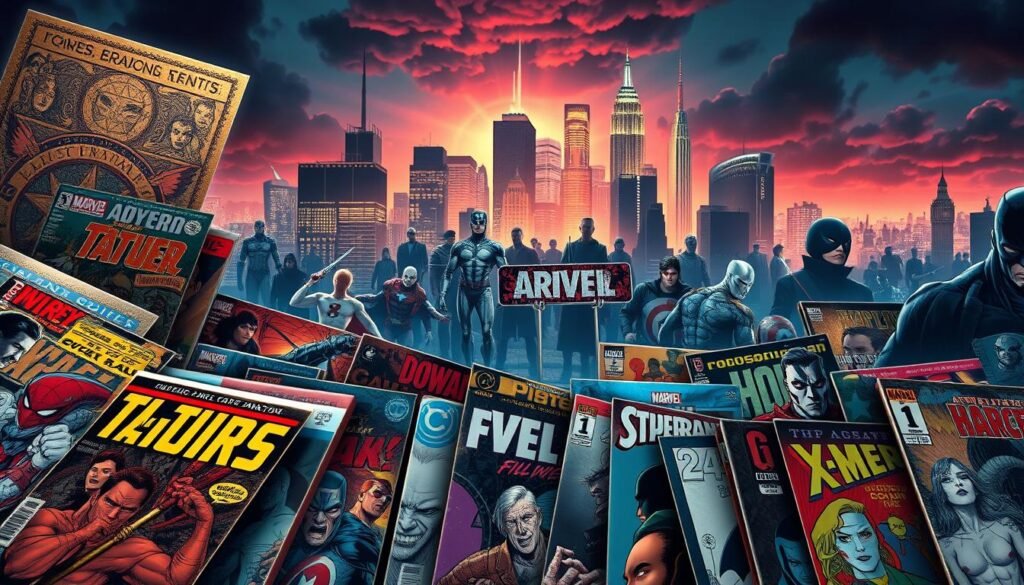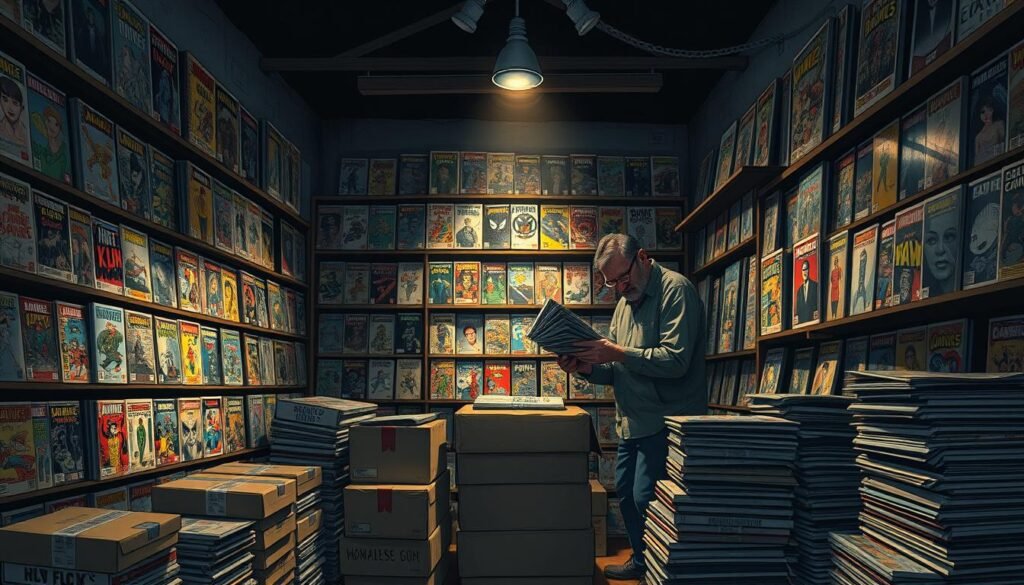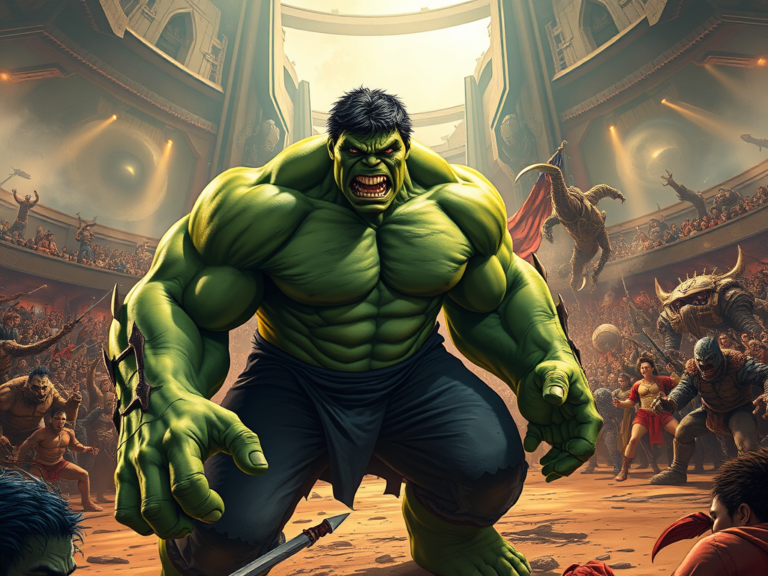Why Variant Comic Covers Send Collectors Into a Buying Frenzy

Ever thought about how a comic book cover could start a big economic wave? The variant comic covers frenzy has turned the comic book world into a complex financial scene.
Now, comic fans and investors are in a new world where art meets money. What started as a special marketing trick has grown into a big market event. It’s changing how people collect comics.
Variant comic covers are more than just different art. They’ve become a smart financial tool. They shape how collectors act, change how comics are made, and offer special chances to invest in comics.
This journey will take you into the world of variant covers. You’ll see how these different covers have changed the comic book collecting scene. We’ll look at limited editions and marketing strategies that drive this market trend.
Ready to uncover the secrets of variant comic covers? See why collectors, publishers, and investors are drawn to this growing market.
Understanding the Evolution of Comic Book Variants
The world of comic book collecting has changed a lot. Variant covers have become a big deal for collectors and investors. What started as a marketing trick has grown into a huge trend in the comic book world.
Comic collecting has changed how publishers release comics. At first, variant covers were rare and special. They made fans excited.
From Novelty to Industry Standard
In the beginning, variant covers were unique items for collectors. Publishers found out these special covers could:
- Attract more collectors
- Increase sales potential
- Create buzz around specific issues
- Generate additional revenue streams
The Rise of Multiple Cover Editions
As the market grew, publishers started releasing many cover editions for one issue. This made variant covers a common marketing tool.
Historical Context of Variant Covers
The late 1980s and early 1990s were key for variant covers. Collectors started seeing comics as investments. This made publishers create more unique and limited edition covers.
Variant covers became more than just alternative artwork—they became collectible artifacts in their own right.
Today, the love for variant covers keeps changing the comic book market. Collectors look forward to unique editions that show off art and could be good investments.
The Economics Behind Variant Comic Covers
The variant comic covers market has turned into a complex world. It’s all about supply, demand, and making money off of speculation. Publishers use smart strategies to get collectors excited and increase the value of their comics.
Comic book variants work under two main economic systems:
- Open-to-Buy (OTB) Variants: Stores can order any amount of different covers
- Gated Variants: Need a certain order amount to get special editions
This creates a sense of rareness that gets collectors buzzing. Some rare covers can sell for hundreds or even thousands of dollars. This shows how big the market for variant covers has become.
The value of variant covers depends on a few things:
- How many are printed
- The artist’s fame
- How unique the cover is
- How much it might be worth in the future
Knowing about these factors can help you make better choices when buying comics. Whether you just like reading them or see them as an investment, the variant comic covers market is full of interesting chances to buy wisely.
“Variant covers are not just art—they’re a financial ecosystem with intricate market mechanisms.” – Comic Book Economics Expert
Types of Variant Covers and Their Market Impact
The world of collectible comics is full of interesting variant cover strategies. These strategies attract both collectors and retailers. Knowing about these limited editions helps you better understand the comic book market.

Comic publishers use clever ways to create excitement and value with unique cover designs. These methods appeal to collectors who love rare and unique items.
Open-to-Buy (OTB) Variants
Open-to-Buy variants offer a flexible option for comic book retailers. Stores can:
- Order multiple covers based on their sales potential
- Minimize financial risk
- Customize inventory to match customer preferences
Gated Variant Editions
Gated variants have specific purchasing conditions. Retailers need to meet certain sales thresholds to get these exclusive comics. Common requirements include:
- Ordering a minimum number of standard covers
- Demonstrating consistent sales performance
- Meeting publisher-specific purchasing criteria
Limited Edition Exclusives
These rare variants are the top choice for collectors. Limited edition covers often have:
- Unique artwork from renowned artists
- Extremely restricted print runs
- Numbered authentication
- Higher market value for collectors
Each variant type offers unique chances for collectors and retailers to dive into the comic book market. Understanding these strategies can change how you collect and invest in comic book variants.
Variant Comic Covers Economics Frenzy in Modern Markets
The comic book market has changed a lot in recent years. Variant comic covers have caused a big economic frenzy. This is different from the 1990s, when the market was more about speculation.
Today, collectors face a complex world of variant covers. They look at more than just speculation. Important factors include:
- Digital age marketing strategies
- Social media-driven collector enthusiasm
- Limited edition artistic collaborations
- Increased collector investment awareness
Collecting has changed a lot. Before, people bought comics hoping to make money fast. Now, collectors know the comic book market’s economics better. They do research and make smart choices about variant covers.
The true value of a variant cover lies not just in its rarity, but in its artistic merit and cultural significance.
Artists and publishers are now more strategic. They create variant covers that appeal to collectors and art lovers. This has made the variant comic covers market more stable and creative.
The current trend shows a deep understanding of collectible markets. Collectors value quality, creativity, and long-term potential more than quick profits.
Publisher Strategies and Production Costs
The comic book market has changed a lot with variant covers. This has made it hard for publishers to deal with speculative investments. They need to balance costs, market demand, and what collectors want when making these special editions.
Publishers have to make tough economic choices with variant covers. They think about many important things:
- How many to print
- Where to send them
- How many collectors will want them
- Keeping collectors excited
Print Run Economics
Understanding print run economics is all about knowing the market well. Publishers look at several things when deciding how many variant covers to make:
- How many collectors might want them
- How valuable they might be for investors
- The artist’s reputation and how unique the artwork is
- How well they’ve sold in the past
Distribution Challenges
Distribution is another big challenge for variant covers. Retailers and distributors have to work together to get them to the right places. Good distribution needs smart analytics and strong partnerships to avoid waste and keep collectors interested.
Knowing about these complex economic issues can help you make better choices in the comic book world.
Impact on Comic Book Retailers

The variant cover craze has changed the comic book world for retailers. It has made the comic book market harder to navigate. Publishers now release many cover editions, making things tough.
Retailers have big challenges with managing variant inventory. The surprise nature of variant covers makes ordering tricky. Small comic shops must balance:
- Customer demand predictions
- Limited financial resources
- Risk of unsold inventory
- Potential collector interest
The financial side is tough. Many retailers face issues with Final Order Cutoff (FOC) variants. These are announced just before ordering deadlines. This tight time frame forces shop owners to guess fast about collector interest.
| Variant Challenge | Impact on Retailers |
|---|---|
| Inventory Risk | Potential overstock or missed sales opportunities |
| Customer Expectations | Pressure to stock rare and limited editions |
| Profit Margins | Reduced due to speculative purchasing |
Your local comic book shop now acts like a strategic investment center. They carefully check each variant’s value. The variant cover craze has turned retailers into market analysts. They need to understand the market and manage risks well.
Collector Psychology and Market Behavior
The world of comic collecting is full of passion and profit potential. It’s a place where emotions and investment strategies meet. How you collect comics can change your fun and your financial gains.
Comic book fans usually fall into two groups during the speculator frenzy:
- Passion-Driven Collectors: They collect for the love of stories and art.
- Investment-Focused Collectors: They see comics as a way to make money.
Investment vs. Enjoyment Dynamics
Knowing why you collect is key. Some love the stories and art, while others look at comics as investments. The 1990s showed how what people think can change how they buy.
Speculative Buying Patterns
Collectors decide based on:
- How rare something is
- The artist’s reputation
- Its historical importance
- How much it might be worth later
Your collecting plan should mix fun with smart buying. While finding rare comics is thrilling, it’s also important to think about your feelings and money.
Secondary Market Dynamics and Price Trends
Understanding the collectible comics market is key. The variant comic covers economics frenzy makes it complex. Value changes a lot due to different factors.
In comic book investments, several elements affect prices:
- Rarity of the specific variant cover
- Condition of the comic
- Popularity of the featured character
- Artist reputation
The collectible comics market is unpredictable. Comics from the 1990s show this, with some keeping value and others dropping.
| Market Factor | Impact on Value |
|---|---|
| Print Run Size | Inversely affects rarity and potential value |
| Cover Artist Popularity | Directly influences collector interest |
| Character Significance | Critical in determining long-term value |
Pro tip: Serious collectors should look at graded comics and follow market trends online. Knowing the variant comic covers economics can turn your hobby into an investment.
“In the world of collectible comics, knowledge is your most valuable asset.” – Comic Collecting Wisdom
Digital Age Influence on Variant Cover Marketing
The comic book market has changed a lot with digital tech. The love for variant covers has grown online, changing how we find and buy special comic book editions.
Digital tools have changed how we market and sell variant covers. Now, collectors can easily find rare and special editions online. This is thanks to online stores and special websites.
Online Sales Dynamics
Online sales have made variant covers more accessible. Key changes include:
- Collectors from all over the world can buy them
- They can track prices and availability in real-time
- There’s a direct link between publishers and fans
Social Media Marketing Strategies
Social media has become a big help in promoting variant covers. Publishers and artists use Instagram and Twitter to:
- Show off exclusive cover art
- Build excitement for new releases
- Talk directly with comic book fans
The digital age has made comic book marketing exciting and interactive. Now, finding, buying, and showing off rare editions is just a few clicks away.
Digital platforms have made it easier for everyone to get into variant covers. It’s now more fun and accessible than ever.
Future of Variant Covers in Comics Industry
The world of variant comic covers is always changing. Publishers are finding new ways to make collectible editions stand out. They’re looking beyond the usual cover designs.
New technologies are changing how we see variant covers. Augmented reality and digital features are making a big impact. Soon, covers might:
- Change when viewed through smartphone apps
- Have interactive digital content
- Give collectors unique experiences
Publishers are focusing on quality over quantity. The future of variant covers is about making meaningful, desirable collectibles. Collectors want artwork that tells a story, not just the usual.
Sustainability is key in making variant covers. Creators are exploring:
- Green printing methods
- Strategies to reduce waste
- Digital-first options
The frenzy around variant comic covers is moving towards smarter strategies. Expect fewer mass-produced variants. Instead, there will be more artist-driven editions that really capture collectors’ hearts.
The future of comics is about creating value, not just volume.
Sustainability and Market Saturation Concerns
The comic book market is facing big challenges that could harm its future. Speculative investment is driving collector behavior, and publishers and retailers must be careful. They need to avoid the dangers of too many comics in the market.
Experts and collectors are worried about the environmental and economic effects of making many variant covers. These covers are for single issues and raise important questions about comic book publishing’s future.
Environmental Considerations
Producing many variant covers has big environmental problems:
- More paper is used
- More carbon is released from printing
- More waste from unsold comics
Market Oversaturation Risks
The comic book market might make the same mistakes as the 1990s. Publishers should be careful not to flood the market with too many variants.
| Risk Factor | Potential Impact |
|---|---|
| Collector Fatigue | Less interest in buying |
| Production Costs | More financial stress for publishers |
| Market Speculation | Collectibles might lose value |
Publishers must find a balance to keep the comic book market healthy. Limiting variant covers could help the industry stay strong in the long run.
Think about the big picture of variant cover production. The future of comic book collecting depends on making choices that are good for the environment and the market’s health.
Conclusion
The comic book world has changed a lot because of variant covers. This change has made collecting comics a complex mix of art and money. It’s important to know how to balance loving comics with being smart about money.
Collecting comics has grown from a simple hobby into a big economic system. Companies like Marvel and DC have learned from past mistakes. They now focus on making comics that are worth collecting, not just for money.
Collectors who are smart know that comics are more than just rare covers. They value the stories, art, and cultural importance of comics. The trend of variant covers shows a lively conversation between creators, publishers, and fans. It’s a place where art and money meet.
The future of comics looks bright and full of possibilities. By staying up-to-date and collecting with both passion and wisdom, you can enjoy the world of comics. You’ll be able to handle the ups and downs of variant covers with excitement and understanding.
FAQ
Q: What exactly are variant comic book covers?
A: Variant covers are different designs for the same comic book. They show various artwork or special treatments. They’re made to attract collectors and add excitement to comic book releases.
Q: How do variant covers impact the comic book market?
A: Variant covers change the comic book market by creating a sense of rarity. They boost collector interest and can increase the value of certain issues. Now, they’re a common marketing tool in comics.
Q: What are the different types of variant covers?
A: There are three main types. Open-to-Buy (OTB) variants are widely available. Gated variants need specific purchases. Limited Edition exclusives have very small print runs.
Q: Are variant covers a good investment?
A: Variant covers can be a gamble. Their value depends on print run, artist fame, and market demand. Always collect with passion and caution.
Q: How do retailers handle variant covers?
A: Retailers manage variant covers by controlling inventory and predicting demand. They balance risks to stay profitable. They order variants strategically.
Q: What drives the current variant cover market?
A: Today’s market is influenced by digital age, social media, and collector psychology. FOMO and the desire for unique items also play a role.
Q: How are variant covers different from the 1990s speculation bubble?
A: Today’s market is more advanced, learning from the 1990s. Publishers and collectors focus on quality and collectibility, not just speculation.
Q: What role does digital marketing play in variant covers?
A: Digital marketing has made variant covers more accessible. It creates buzz online and helps collectors find and trade rare variants.
Q: Are there environmental concerns with variant covers?
A: Yes, making multiple covers for one issue wastes paper and resources. Some publishers are looking into sustainable options.
Q: What is the future of variant covers?
A: The future might include augmented reality covers and sustainable production. There could also be new ways to keep collectors interested without overdoing it.






